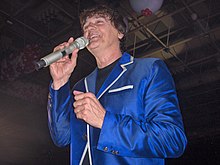Zdravko Čolić
Zdravko Čolić (also kyr. Здравко Чолић; born May 30, 1951 in Sarajevo , Yugoslavia ) is a Serbian singer and producer . He is one of the most popular singers in the area of the former Yugoslavia.
Early years
Zdravko Čolić was born on May 30, 1951 in Sarajevo . In his youth he was more interested in sport than music. First he was a goalkeeper in the youth team of the football club FK Željezničar Sarajevo , later he switched to athletics . As a teenager he won several medals, but stopped playing when he failed to achieve any further success. Because of his talent for performing and acting, he was accepted into a youth theater.
Music was a hobby of his back then, he learned to play the guitar and attended music school. He often played with his friend Braca Isović and together with him achieved a modest degree of local fame as the duet Čola and Isa from Grbavica , named after a district of Sarajevo. Encouraged by friends, he took part in the amateur singing competition in Bijela in Herceg Novi ( Montenegro ), where he received second prize and his first singing fee with the Beatles song Lady Madonna .
Encouraged by this success, he joined the group “Mladi i lijepi” (Young and Beautiful) in order to switch to the “Ambasadori” in 1969. The band members were at this time, with the exception of Čolić and the guitarist Slobodan Vujović, conscripts of the Yugoslav army. Due to the increasing number of offers that the military service could not all accept, Čolić and Vujović founded a new formation. At the hit festival "Vaš šlager sezone" in 1970, the new formation reached seventh place. Afterwards, Čolić was the singer of the Belgrade progressive rock formation Korni grupa , soon returned to Sarajevo and took third place at the 1972 Schlager Festival with the song “Sinoć nisi bila tu”, which officially began his solo career.
Solo career
In 1972 Zdravko Čolić landed his first big hit with the Kemal Monteno song "Sinoć nisi bila tu" (You weren't there last night), which Josipa Lisac was originally supposed to sing at the Schlager Festival. In 1973 he was Yugoslavia's representative at Eurovision . His song "Gori vatra" (The fire is burning) took penultimate place, but was a great success in Yugoslavia. At the Belgrade hit festival “Hit parada” in 1974 he won first place with “Ona spava” (She Sleeps) and became a crowd favorite. Other hits followed such as “April u Beogradu” (April in Belgrade) or “Zvao sam je Emili” (I called her Emily).
In 1975 his first album "Ti i ja" (you and me) was released. His second album "Ako priđeš bliže" (When you come closer) in 1977 sold over 900,000 copies and contains his most famous songs. Čolić was traded as the Yugoslav John Travolta . Despite his popularity at that time, he had to serve his military service 1978-1979. Around 1980 he reached the peak of his career and was considered the most popular musician in Yugoslavia.
In 1983 he moved from Sarajevo to Ljubljana , where he worked as a producer together with Goran Bregović . He then lived in Zagreb before moving to Belgrade in 1990, where he lives today. After a long career break, especially during the Yugoslav Wars , he started a comeback in 1995. His first album after the comeback "Kad bi moja bila" (If you were mine) 1997 he produced together with Goran Bregović, who wrote most of the songs for the album. Zdravko Čolić is married to Aleksandra and has two daughters.
Web links
- official page
- Zdravko Colic in the Internet Movie Database (English)
- Zdravko Čolić at Discogs (English)
- Zdravko Čolić - Fan Club
Individual evidence
| personal data | |
|---|---|
| SURNAME | Čolić, Zdravko |
| BRIEF DESCRIPTION | Yugoslav or Serbian musician |
| DATE OF BIRTH | May 30, 1951 |
| PLACE OF BIRTH | Sarajevo |

